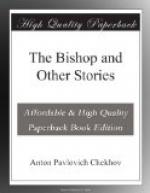A bustard flew up by the very road. Fluttering his wings and his tail, he looked, bathed in the sunshine, like an angler’s glittering tin fish or a waterfly flashing so swiftly over the water that its wings cannot be told from its antenna, which seem to be growing before, behind and on all sides. . . . Quivering in the air like an insect with a shimmer of bright colours, the bustard flew high up in a straight line, then, probably frightened by a cloud of dust, swerved to one side, and for a long time the gleam of his wings could be seen. . . .
Then a corncrake flew up from the grass, alarmed by the hurricane and not knowing what was the matter. It flew with the wind and not against it, like all the other birds, so that all its feathers were ruffled up and it was puffed out to the size of a hen and looked very angry and impressive. Only the rooks who had grown old on the steppe and were accustomed to its vagaries hovered calmly over the grass, or taking no notice of anything, went on unconcernedly pecking with their stout beaks at the hard earth.
There was a dull roll of thunder beyond the hills; there came a whiff of fresh air. Deniska gave a cheerful whistle and lashed his horses. Father Christopher and Kuzmitchov held their hats and looked intently towards the hills. . . . How pleasant a shower of rain would have been!
One effort, one struggle more, and it seemed the steppe would have got the upper hand. But the unseen oppressive force gradually riveted its fetters on the wind and the air, laid the dust, and the stillness came back again as though nothing had happened, the cloud hid, the sun-baked hills frowned submissively, the air grew calm, and only somewhere the troubled lapwings wailed and lamented their destiny. . . .
Soon after that the evening came on.




